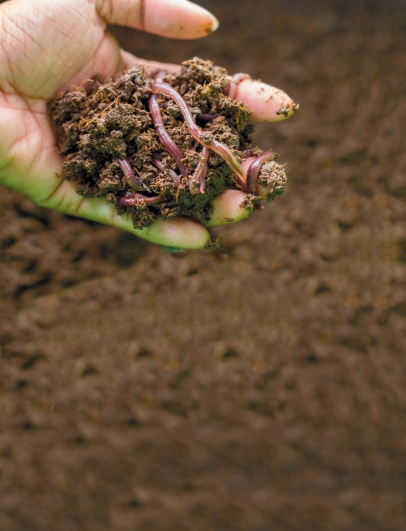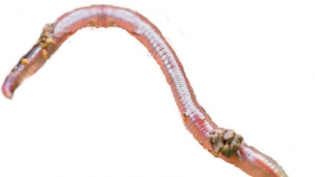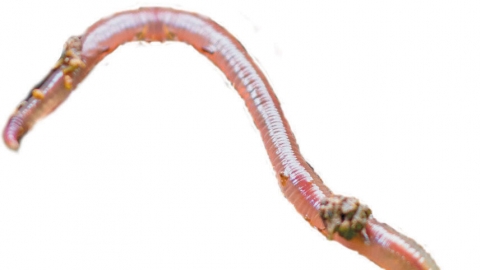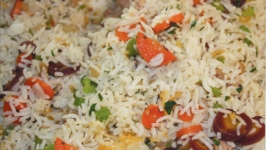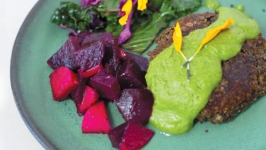One Man's Garbage is Another's Gardening Treasure
Believe it: Even my garbage now has a price. A surprisingly large Ojai contingent has adopted a few hundred earthworms as pets, wanting to give them nothing but the best to eat. Choice organic juice pulp is the rage. The wigglidds must make good pets insofar as their litter tray production is the gardening gold one desires. Put it in the dirt and magically the tomatoes proliferate.
One of my customers—let’s call her Genevieve—was not a typical member of the backdoor brigade, the slop-slinging chicken and hog tribe that battle for scrap primacy. As a musician, her hands were far too elegant for that. The heaping buckets of vegetable matter out the back have lately become more desirable, so, when she saw me hesitate about her request, she anointed me with the ultimate, and heretofore never imagined, tribute: “I can pay you for it.”
My mind cartwheeled through the possibilities. Should I bother to weigh each bucket and determine a by-the-pound price, or just sell the buckets in bulk? Put the daily loads up for auction on eBay? I wouldn’t want to be greedy, but no one should be. Maybe I should sell shares of garbage like the CSA, parceling it out weekly at a fair price, or create a work-trade scenario. But now that my kitchen scraps have finally been appropriately appraised, the honor is value enough. At last, my cultish obsession with compost and fresh green chicken feed is honored as it should be.
Conscience demands there’s no need to make money at both doors. I’ll keep giving away the treasure.
Restaurants that don’t use garbage disposals and make compost instead, as once we performed, were very uncommon 17 years ago when Olivia Chase first conceived of The Farmer and The Cook.
At the end of the last century, throwing the broccoli stems, lettuce butts and banana peels in the dumpster was permitted, but a sacrilege all the same. Now we are moving toward more enlightened processes. Our challenge in 1999 was simple because pitching all that wonderful waste down the hole seemed so primitive. Never mind that lovers of technology and stainless steel hygiene considered me the primitive for zealously trucking food scraps back to where they originated. One man’s gold is another man’s garbage, I suppose.
Every two or three days, I would load up the truck and haul our rotting mess to the farm and compost it like a good slave to the future of unborn generations. At first, I meticulously made huge, layered compost cakes, just as I had been instructed in the sunlit days at Camp Joy Garden, where I took out a master’s degree in excremental transmutation. To get a good pile burning you need heat and what’s hot is nitrogen. In the day, we were always scouting around for one of the least desirable of all commodities: manure. Like crazed dingbats, we would gratefully shovel out people’s barns and scrape their steaming olfactory-challenging paddocks.
There is a limit to how much excrement a man can handle, and I found mine in 2003. Instead of making careful piles even Ecology Action’s cofounder John Jeavons might aspire to, I began backing the truck onto an empty bed at the farm and piling the mess into windrows I could then rototill with my tractor.
After a week or so, you’d never even guess I had been there. The microbes had devoured the scraps admirably, and were even willing to disappear the citrus rinds.
Friend Jeff Otterbein once disapproved of these windrowed shortcuts, and I was chastised until Lisa Brenneis, renowned documentarian and Ojai citrus grower, told me my method was all the rage in Great Britain.
“They call it bastard trenching,” she said.
“That’s me,” I replied.
I guess I was ahead of my time. I’ve been a bastard trencher and a food-waste-reducing farmer, restaurant owner and Meiner’s Oaks resident for a long time. It’s about time that food waste become a rallying cry throughout the land, both because food scraps in the landfill are costly and polluting, and because food scraps in your worm bin are key to a better garden.
My customer Genevieve can’t handle it all. You too can take steps to divert methane-burping garbage from the landfill and get a better value from a material previously treasured solely by organic farming nuts and tree-hugging fools. Your tomato plants will thank you.


